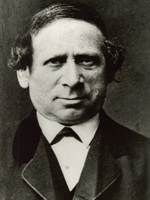Theodor Benfey
| Theodor Benfey | |
|---|---|
 |
|
| Born |
28 December 1809 Nörten-Hardenberg |
| Died | 26 June 1881 (aged 71) Göttingen |
| Nationality | German |
| Occupation | philologist |
Theodor Benfey (28 January 1809, in Nörten near Göttingen – 26 June 1881, in Göttingen) was a German philologist.
He was the son of a Jewish trader from Nörten in Lower Saxony. Although originally destined for the medical profession, Benfey's taste for philology was awakened by a careful instruction in Hebrew which he received from his father. After brilliant studies at Göttingen he spent a year at Munich, where he was greatly impressed by the lectures of Schelling and Thiersch, and afterwards settled as a teacher in Frankfurt.
Benfey's pursuits were at first chiefly classical, and his attention was diverted to Sanskrit by an accidental wager that he would learn enough of the language in a few weeks to be able to review a new book upon it. This feat he accomplished, and rivaled in later years when he learned Russian in order to translate V. P. Vasilev's work on Buddhism. For the time, however, his labours were chiefly in classical and Semitic philology. In 1834 he became a privatdozent (lecturer) at the University of Göttingen, teaching Sanskrit and comparative grammar. At Göttingen, he wrote a little work on the names of the Hebrew months, proving that they were derived from the Persian, prepared the great article on India in Ersch and Gruber's Allgemeine Encyclopädie der Wissenschaften und Künste, and published from 1839 to 1842 the Griechisches Wurzellexikon ("Lexicon of Greek Roots") which gained him the Volney prize of the Institute of France.
...
Wikipedia
